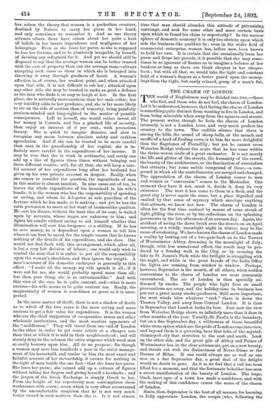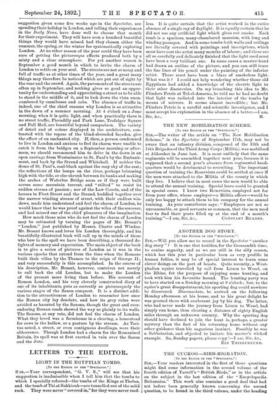THE CHARM OF LONDON.
rr HE world of Englishmen may be divided into two,—those- 1 who feel, and those who do not feel, the charm of London. Let it be understood, however, that feeling the charm of London is something quite distinct from wanting to live in London, and from being miserable when away from the squares and streets. The present writer, though he feels the charm of London. intensely, is not a London lover, and very much prefers the- country to the town. The audible silence that there is among the hills, the sound of sheep-bells, or the munch and snuffle of a herd of feeding cows, is to him far more delightful than the flagstones of Piccadilly ; but yet he cannot cross- Waterloo Bridge without the sense that he has come within the thrice-woven circle of a great enchanter. It is not merely the life and glitter of the streets, the humanity of the crowd,. the beauty of the architecture, or the fascination of association that attracts ; but some subtle compound of these,—a com- pound in which all the contributories are merged and changed. The appreciation of the charm of London comes to men and women as " conversion " comes to the Methodist. One- moment they have it not, scout it, deride it, deny its very existence. The next it has come to them in a flash, and the- great city is never again the same, but a place dignified and exalted by that sense of mystery which envelops anything: that attracts, we know not how. The charm of London is often for the first time realised by means of some streak of light gilding the river, or by the reflections on the splashing pavements in the late afternoon of an autumn day. Again, the accident of seeing the dawn break over the streets on an April morning, or a windy, moonlight night in winter, may be the cause of awakening. We have known the charm of London made- a reality by looking out of a two-pair-back on to the Towers of Westminster Abbey, dreaming in the moonlight of July; though, with less sensational effect, the result may be pro- duced by a Sunday walk in the City, or by crossing the lake in St. James's Park while the twilight is struggling with the night, and while in the great façade of the India Office the lights are running from window to window. Perhaps,. however, September is the month, of all others, when sudden conversions to the charm of London are most commonly encountered. The air of London is then specially un- dimmed by smoke. The people who light fires on small provocations are away, and the holiday-time in business has put out a great many smoke-producers. Still more important,. the west winds blow whatever "reek" there is down the- Thames Valley, and away from Central London. It is thus in September that London looks its best. Just now the view from Waterloo Bridge shows us infinitely more than it does in other months of the year. Usually, St. Pawl's is the boundary, but on a fine September day, a wilderness of those beautiful white stone spires which are the pride of London come into view, and beyond them is a quivering haze that tells of the myriad- ehimneyed city that stretches to the east and north. Look on the other side, and the great pile of Abbey and Palace of Westminster has, in the clear autumn air, put on a new beauty, and stands out with the distinctness of Notre-Dame or the- Duomo of Milan. If one could always see as well as one sees on a fine September day, a great deal of the delight would no doubt be gone. As it is, we feel that a veil has been lifted for a moment, and that the fortunate beholder has seen. a secret manifestation of the beauty of London. The huge, black, inert ogre of a town has made a confidence, and with the making of this confidence comes the sense of the charm of London.
Since, then, September is the best of all seasons for learning to fully appreciate London, the couple ;who, following the
suggestion given some five weeks ago in the Spectator, are spending their holiday in London, and telling their experiences in the Daily News, have done well to choose that month for their experiment. They will have seen a hundred beautiful things they would have missed had they chosen either the summer, the spring, or the winter for systematically exploring London. At no other season of the year could they have been sure of getting the picturesque effects produced both by a misty and a clear atmosphere. For yet another reason is September a good month in which to invite the charm of London to settle on your soul. The streets are not so noisy and full of traffic as at other times of the year, and a great many things may therefore be noticed which are put out of sight by the roar and the crowd. Again, the pavements of the streets are often up in September, and nothing gives so good an oppor- tunity for understanding and appreciating a street as to be able to stand in the middle of it, and to look down the vista unen- cumbered by omnibuses and cabs. The absence of traffic is, indeed, one of the chief reasons why London is so attractive in the dawn of a summer morning. At 4 o'clock on a June morning, when it is quite light, and when practically there is no street traffic, Piccadilly and Park Lane, Trafalgar Square and Pall Mall, are beautiful beyond comparison. The variety of detail and of colour displayed in the architeCture, con- trasted with the repose of the blind-shrouded facades, give the effect of an enchanted city. If, then, a person condemned to live in London and anxious to feel its charm were unable to catch it from the bridges on a September morning or after- noon, we should recommend him to drive in the dawn in an open carriage from Westminster to St. Paul's by the Embank- ment, and back by the Strand and Whitehall. If neither the dome of St. Paul's, coal-black against the rosy sky of the east; the reflections of the lamps on the river, perhaps brimming high with the tide, or else shrunk between its banks and making the arches of Waterloo Bridge seem as if they were built across some mountain torrent, and " stilted " to resist its sudden storms of passion ; nor of the Law Courts, and of the houses in Fleet Street and the Strand, huddled together over the narrow winding stream of street, with their endless win- dows, made him understand and feel the charm of London, he would know that he was proof against the wiles of the sorcerer, and had missed one of the chief pleasures of the imagination.
How much those miss who do not feel the charm of London may be estimated by turning the pages of Mr. Besant's London," just published by Messrs. Chatto and Windus. Mr. Besant knows and loves his London thoroughly, and his beautifully-illustrated book will call up in the minds of those who bow to the spell we have been describing, a thousand de- lights of memory and expectation. The main object of the book is to give a series of pictures of London as it was in the various epochs that extend from the time when the Romans built their villas by the Thames to the reign of George II., and very successfully is this accomplished. In the course of his description, Mr. Besant, however, contrives not merely to call back the old London, but to make the London of the present more living than before. His account of Roman London, and his very cleverly constructed diary of oiie of its inhabitants, puts as correctly as picturesquely the various stages of the Saxon conquest. It is a distinct addi- tion to the attractiveness of London to remember how once the Roman city lay desolate, and how its grey ruins were avoided as haunted by the Saxons, though the great and ever- -enduring Roman roads showed the way so plainly to its walls. The Saxons, at any rate, did not feel the charm of London. What they loved was a farmhouse in a clearing, a homestead for cows in the hollow, or a pasture by the stream. As Taci- tus noted, a street, or even contiguous dwellings, were their abhorrence. Though London had a charm for the Romanised Britain, its spell was at first exerted in vain over the Saxon and the Jute.



































 Previous page
Previous page